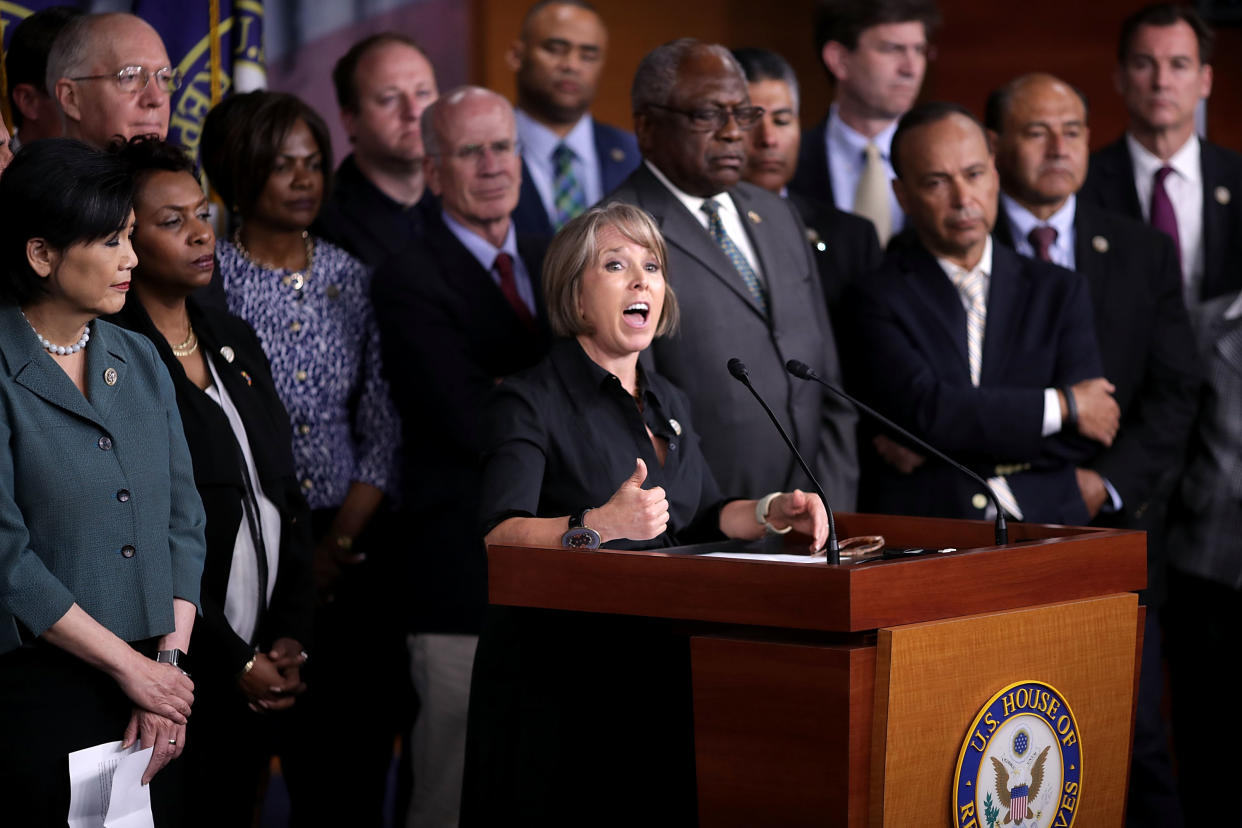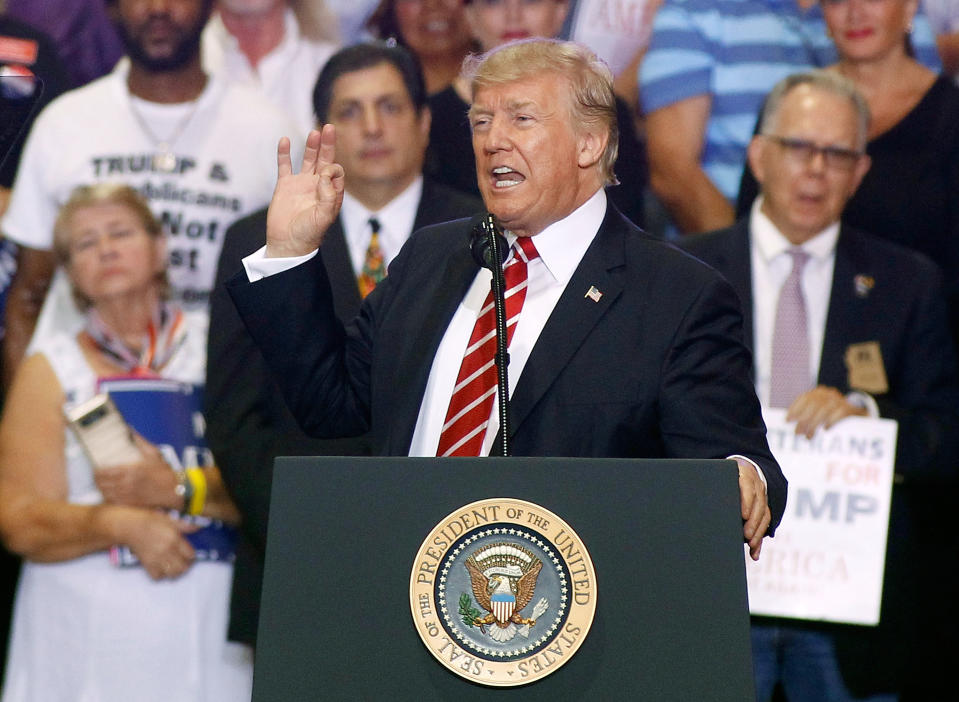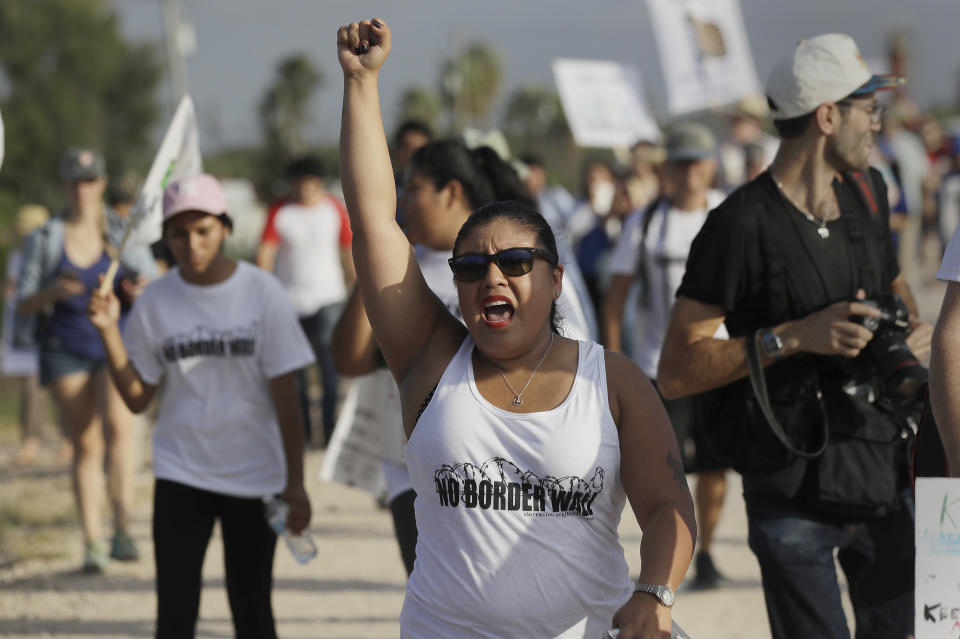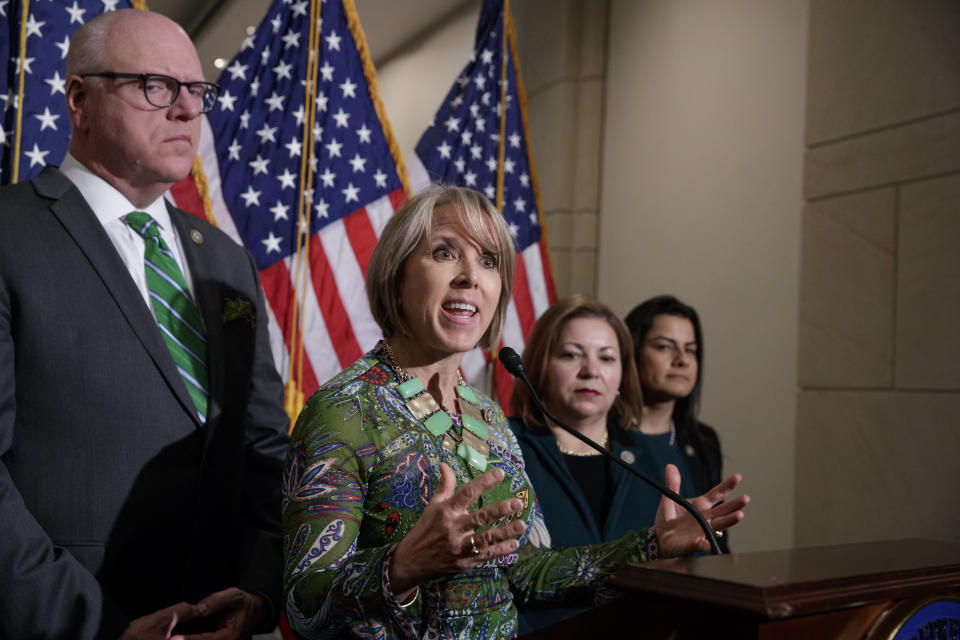Congressional Hispanic Caucus battles Trump — and sometimes its own party — over immigration

WASHINGTON — For the Congressional Hispanic Caucus, one adversary is clear: President Trump and his plans to deport millions of undocumented residents.
The group has been kept busy in recent months by a White House it says is anti-immigrant and anti-Latino. While the CHC was often at odds with President Barack Obama over immigration matters, it is faced with an entirely new struggle, as it must work with a president who has made no bones about his desire to deport millions of undocumented immigrants, saying it is necessary to keep the country safe.
“My administration will never back down in demanding immigration control,” Trump said at a rally in Phoenix last week. “The American people voted for immigration control. That’s one of the reasons I’m here, and that is what the American people deserve, and they’re going to get it.”
CHC Chair Michelle Lujan Grisham, D-N.M., said that while there were “considerable disagreements” with the Obama administration over immigration issues, the manner in which Trump speaks of undocumented immigrants has ratcheted up the stakes.
“The big difference is we believe the Obama administration and the Bush administration and even the Clinton administration wanted a different environment — they wanted to protect the 11 million people who are working hard and doing well here,” Lujan Grisham told Yahoo News. “And the Trump administration wants them all gone. And that is a whole different dynamic that has nothing to do with the current law on the books.”

But another, less obvious roadblock has also emerged for the 30 members of the CHC, all of whom are Democrats: their own party. Despite the fact that Latino voters have become a bedrock of the Democratic Party, lawmakers say that issues affecting them can often get left behind.
“We have said before that it seems at times as though Latino issues are allowed to be negotiated versus, for example, things like gay rights issues, like choice issues, which are all important to the Democratic Party,” Rep. Ruben Gallego, D-Ariz., told Yahoo News.
This presents a challenge for the CHC, even as its voice appears to be growing in Congress.
The caucus was founded in 1976 by a group of five lawmakers looking to enhance the influence of Hispanics of all parties in Congress. Hispanic Republicans have since left the caucus to form a group of their own, the Congressional Hispanic Conference, although the two parties still work together on the nonprofit Congressional Hispanic Institute.
In the 115th Congress, the CHC gained five members, including Sen. Caroline Cortez Masto, D-Nev., the first Latina to serve in the Senate, and the first Dominican-American in Congress in Rep. Adriano Espaillat, D-N.Y.
Like Gallego and Lujan Grisham, most of the caucus members hail from border states, but Hispanic lawmakers from states such as Illinois and New York are also in the group. Virtually all of them represent areas with a significant Latino population.

And members are clear in their desire to fight for their Latino constituents, even if it means a fight with their own party. A flash point for this was a supplemental appropriations bill approved earlier this year, which many CHC members say included provisions that were tantamount to funding Trump’s proposed wall along the U.S.-Mexico border.
House Minority Leader Nancy Pelosi, D-Calif., argued that there was no such funding, but this didn’t stop members from saying they were misled by leadership over the contents of the bill.
“I think Pelosi misled our caucus in the last supplemental because it was $300 million allocated for replacement fencing in Arizona and California,” CHC member Rep. Filemon Vela, D-Texas, said at the time. “In my view, if you voted yes on that budget, you are voting for the down payment that Donald Trump talks about on his wall.”
Gallego and others also said the incident was an example of how the caucus can often take a back seat to other pillars of the Democratic Party.
“If you had attached an anti-Planned Parenthood bill to one of these defense appropriations bills, I would’ve automatically voted no,” Gallego said. “And I think the rest of the caucus would’ve done so, but that type of attention isn’t there [for Hispanic issues] that there is to other issues, and this is why the Latino caucus is important, basically to provide that advocacy and pressure.”
Lujan Grisham said that claims that the bill didn’t have explicit funding for the wall missed the point, saying funds could be moved around in an effort to pay for the physical structure in a back-door way.
“You can’t have these negotiations and say, ‘Because there’s no outward funding for the wall, we as the Democratic caucus will not whip opposition to this bill,’” she said. “Well, that’s not fair to the Hispanic caucus, who wants the Democratic caucus to absolutely whip in opposition and to tell our Republican counterparts as they are negotiating that the wall is a nonstarter.”

Only 15 Democrats, most of them members of the CHC, voted against that bill. And while they joined over 100 Republicans in opposition, it still passed overwhelmingly.
Rep. Joe Crowley, D-N.Y., the Democratic caucus chair, told Yahoo News that he didn’t think the bill had border wall funding in it but added he could see where beefing up border security could be seen as an issue for members.
“It was just looking at the same thing and interpreting it differently,” Crowley said. “I don’t personally believe that there was language in that proposal for a border wall. And I think we made it clear we will not support funding for a border wall. … So I don’t dismiss those concerns, but at the same time I don’t necessarily agree with their interpretation of it.”
CHC members say leadership was more responsive when Republicans opted to attach funding for a 27-mile chunk of Trump’s wall to a so-called minibus package of spending bills last month.
House Speaker Paul Ryan, R-Wis., did so with the aim of courting the support of more conservative lawmakers who vowed to oppose any appropriations bill without the border wall funding. The bill cleared the House last month, although it faces an uncertain future in the Senate.
Only a handful of Democrats wound up voting for the minibus, and top House Democrats, including Pelosi and Minority Whip Steny Hoyer, D-Md., publicly criticized the border wall funding.
Lujan Grisham said the caucus was “cautiously optimistic” that relations had improved.
“There is a heightened sense of awareness that we have to be skeptical about what is being proposed to us when it’s affecting people’s lives in the way that it currently is,” she said.
Gallego agreed, saying that the caucus must be more outspoken lest their caucus be left behind by the party as a whole.
“It’s a lesson on the part of our caucus that we can’t assume that leadership is going to look out for the interests of our community, that we have to communicate clearly, and when we did that it was a big difference,” he said.
But the caucus has made no bones about criticizing Trump, whether it’s for the border wall or immigration authorities targeting law-abiding undocumented immigrants and detaining students, laborers and those who receive public services, such as food stamps.
Lujan Grisham said that the caucus would like the Department of Homeland Security and Immigration and Customs Enforcement to focus their efforts on detaining and deporting the minority of immigrants who have committed crimes.

But by and large, she said, this is not happening, despite Trump’s pledges to target “bad guys.”
“Our position is, whether you’re a citizen or not, we expect DHS to do everything in its power to address violent or repeat criminal offenders, and those serious offenders, we want them out of the country just like everyone else does,” she said. “That’s a more than reasonable effort on the part of DHS to do that. But they’re not directing their resources there. They’re not even asking for resources there.”
Despite past bumps in the road between the CHC and leadership, Crowley said the caucus has remained steadfast in its leadership within the party against Trump’s immigration agenda.
“In many respects the [CHC] has been the conscience of the Democratic caucus … on the issue of comprehensive immigration reform and anti-immigration policies coming up under the Trump administration,” he said. “They’ve been leading the charge in opposition to that. I think that’s recognized by the broader [Democratic] caucus as well.”
And Democrats say they are looking to the 2018 midterm elections to further increase the CHC’s membership. Crowley said that activism pushing back on mass deportation and the administration’s treatment of immigrants is a sign that voters understand the need for change.
“I think that as much as some people may have been turned off by what has come out of the White House and some of those agencies, I think far more people are being turned on politically and understand the real threat that Donald Trump and his administration pose for our country,” Crowley said.
While Lujan Grisham is vacating her House seat to run for governor in New Mexico, she noted that interest is up among Hispanic candidates, particularly women, and that the political action committee associated with the CHC has seen a marked uptick in donations.
And given demographic changes throughout the country, she expressed confidence that the CHC would remain a force to be reckoned with.
“More people than ever are interested in supporting those candidates so that they’re successful,” Lujan Grisham said. “And if you look at the growth in terms of [demographics], young Americans are Hispanics. So there’s no doubt that this caucus will get more and more important and more and more influential.”
_____
Read more from Yahoo News:

